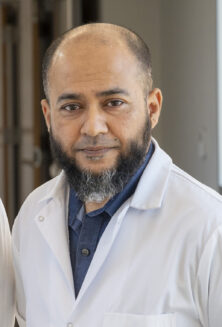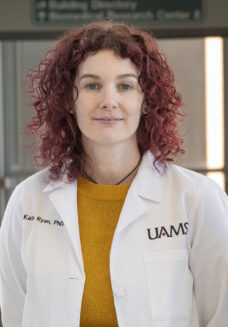Research Project Leaders (RPLs)
One of the most important functions of any COBRE is to assemble a critical mass of investigators in a given scientific area. At any given time, the CMIC supports up to five junior investigators who serve as Research Project Leaders (RPLs). The projects supported by the CMIC are typically centered on using structural biology and quantitative molecular approaches to understand cancer biology and therapeutics. In that way, research associated with the CMIC usually has some component aligned with the equipment and services provided by the Structural Biology Core and the Biomolecular Interactions Core. The active RPLs are listed below, along with a brief description of their COBRE-related research program.

Sayem Miah, Ph.D., is an Assistant Professor in the Department of Biochemistry and Molecular Biology. His COBRE-supported project is focused on a newly discovered set of protein interactions that influence the packaging of DNA in breast cancer. Dr. Miah’s COBRE mentors are Alan Tackett, Ph.D., and Tudor Moldoveanu, Ph.D.

Katie Ryan, Ph.D., is is an Assistant Professor in the Department of Biochemistry and Molecular Biology. Her COBRE-supported project is focused on investigating a non-canonical Rho GTPase called Rnd3 that has distinctive ways of promoting metastasis in different tumor types. Dr. Ryan’s COBRE mentors are Marjan Boerma, Ph.D., and Ruud Dings, Ph.D.

Joonas Jamsen, Ph.D., is an Assistant Professor in the Department of Biochemistry and Molecular Biology. His COBRE-supported project is focused on studying the proteins and enzymes that participate in a DNA repair process called microhomology-mediated end joining. Dr. Jamsen’s COBRE mentors are Kevin Raney, Ph.D., and Wayne Wahls, Ph.D.
Graduated RPLs

Mohammad Rahman, Ph.D., is an Assistant Professor in the Department of Biochemistry and Molecular Biology exploring the regulation of gene expression through alternative splicing and mRNA decay. In July of 2024, he was awarded a five year, Maximizing Investigators’ Research Award (MIRA; PAR-23-145) from the National Institute of General Medical Sciences (NIGMS) for his project entitled “Decoding Mechanisms of Nonsense-mediated mRNA Decay through Alternative Splicing” (R35 GM154991). Dr. Rahman’s COBRE mentors were Angus MacNicol, Ph.D., and Fenhuang Zhan, Ph.D.

Adam Wolfe, M.D., Ph.D., is a clinician-scientist who studies mechanisms in pancreatic adenocarcinoma that allow these tumors to survive radiation therapy. Dr. Wolfe graduated from the CMIC when he was awarded a prestigious American Cancer Society grant to pursue is COBRE-related work of “Targeting the KRAS-USP7-RAD18 Axis” (ASTRO-CSDG-23-1037280-01-CDP). Dr. Wolfe’s COBRE mentors were Fen Xia, M.D., Ph.D., and Eric Enemark, Ph.D.
Pilot Projects for 2024
Supported by funds from the UAMS College of Medicine, the CMIC Pilot Project Program continues to identify researchers with ideas that align with the mission of the center and that could serve as a foundation for a full-fledged COBRE research project. To help these ideas mature and obtain key preliminary results, the CMIC funds up to two $75,000 Pilot Project awards annually. The next Request For Proposals for Pilot funding is expected in February, 2025.
In 2024, two projects were selected for Pilot Project funding.

The Pilot Award for the proposal entitled “Biophysical insights into AID mutagenic activity at DNA secondary structure hotspots” will support work on understanding the molecular mechanisms behind the genomic instability in diffuse large B-cell lymphoma. Her proposal incorporates elements from the CMIC mission and the Core facilities to define and exploit the molecular interactions between a mis-regulated mutagenic protein and the nuclear genome to minimize the risk associated with resistance to chemotherapy.

The Pilot Award for the proposal entitled “Molecular role of TLK1 and 2 interactions within the DNA damage response” will fund Dr. West’s research on the role of aberrant protein and kinase signaling in the DNA repair pathway in the development of cancer. His proposal will utilize the expertise of the CMIC investigators as well as the Core facilities to investigate the molecular protein dynamics and the formation of active complexes that lead to genomic instability and cancer.
How to Acknowledge the CMIC
“Research reported in this [publication, release] was supported (in whole or in part) by the National Institute of General Medical Sciences of the National Institutes of Health under Award Number P20GM152281. The content is solely the responsibility of the authors and does not necessarily represent the official views of the National Institutes of Health.”
For abstracts, a short note “Supported by a grant from the NIH/NIGMS – 1P20GM152281” will suffice.
